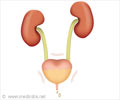Women with urinary incontinence reported declines in sexual activity and arousal, whereas men reported declines in sexual desire, increased erectile and orgasm difficulties, stated study.

‘Men and women with urinary incontinence report declines in sexual activity and other sexual functions.’





“Both urinary incontinence and later-life sexuality remain taboo subjects in society and are likely to be under-reported as coexisting health problems," said lead author Dr. David Lee, of Manchester Metropolitan University, in the U.K. "Given the relatively high occurrence of incontinence, particularly among women, healthcare professionals should be aware of the potential impacts on quality-of-life and well-being, and recognise that sexual activity and satisfaction are key factors in this equation."
Source-Eurekalert















